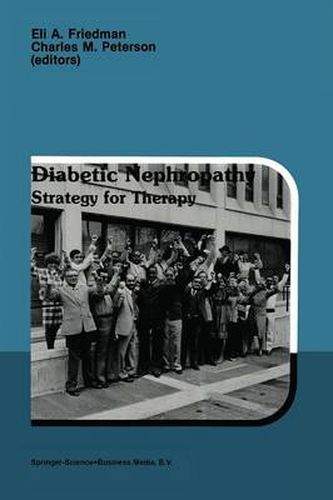Readings Newsletter
Become a Readings Member to make your shopping experience even easier.
Sign in or sign up for free!
You’re not far away from qualifying for FREE standard shipping within Australia
You’ve qualified for FREE standard shipping within Australia
The cart is loading…






This title is printed to order. This book may have been self-published. If so, we cannot guarantee the quality of the content. In the main most books will have gone through the editing process however some may not. We therefore suggest that you be aware of this before ordering this book. If in doubt check either the author or publisher’s details as we are unable to accept any returns unless they are faulty. Please contact us if you have any questions.
Diabetic nephropathy is a tragic illness. Its often insidious onset in the insulin dependent (type I) diabetic, typically a young adult, heralds the last act in the course of a disease that will increasingly become the dominant preoccupation in the patient’s shortened life. For most type II diabetics, the beginning of clinical renal insufficiency is but a phase in a continuous deterioration that affects the integrity ofjob, marriage, and family. The nephropathic diabetic is hypertensive, has worsening retinopathy, and more often than not, is also plagued by peripheral vascular insufficiency, heart disease, gastrointestinal malfunction, and deepening depression. Until the 1980’s, few type I diabetics who became uremic (because ofdiabetic nephropathy) lived for more than two years. Hardly any attained true rehabilitation. This dismal prognosis is changing substantially for the better. Research in diabetes has resulted in striking advances at both ends of the type I diabetic’s natural history. In one exciting clinical trial now underway in London, Ontario, halfofchildhood diabetics treated with cyclosporine within six weeks of onset evince permanent disappearanceofhyperglycemia and the need for insulin. At the otherendofthe natural historyofdiabetes for the nephropathic patientwith worsening eye disease (renal-retinal syndrome), who receives a kidney transplant, patient and graft survival, two years after cadaveric kidney transplantation in type I diabetics is now equal to that of the nondiabetic.
$9.00 standard shipping within Australia
FREE standard shipping within Australia for orders over $100.00
Express & International shipping calculated at checkout
This title is printed to order. This book may have been self-published. If so, we cannot guarantee the quality of the content. In the main most books will have gone through the editing process however some may not. We therefore suggest that you be aware of this before ordering this book. If in doubt check either the author or publisher’s details as we are unable to accept any returns unless they are faulty. Please contact us if you have any questions.
Diabetic nephropathy is a tragic illness. Its often insidious onset in the insulin dependent (type I) diabetic, typically a young adult, heralds the last act in the course of a disease that will increasingly become the dominant preoccupation in the patient’s shortened life. For most type II diabetics, the beginning of clinical renal insufficiency is but a phase in a continuous deterioration that affects the integrity ofjob, marriage, and family. The nephropathic diabetic is hypertensive, has worsening retinopathy, and more often than not, is also plagued by peripheral vascular insufficiency, heart disease, gastrointestinal malfunction, and deepening depression. Until the 1980’s, few type I diabetics who became uremic (because ofdiabetic nephropathy) lived for more than two years. Hardly any attained true rehabilitation. This dismal prognosis is changing substantially for the better. Research in diabetes has resulted in striking advances at both ends of the type I diabetic’s natural history. In one exciting clinical trial now underway in London, Ontario, halfofchildhood diabetics treated with cyclosporine within six weeks of onset evince permanent disappearanceofhyperglycemia and the need for insulin. At the otherendofthe natural historyofdiabetes for the nephropathic patientwith worsening eye disease (renal-retinal syndrome), who receives a kidney transplant, patient and graft survival, two years after cadaveric kidney transplantation in type I diabetics is now equal to that of the nondiabetic.